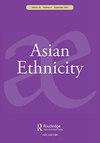Tiurki i irantsi v Tanskoi imperii [Turks and Iranians in the Tang Empire]
IF 0.8
Q3 ETHNIC STUDIES
引用次数: 0
Abstract
principle of res judicata. The Sarbanda Sonowal judgment, according to Bhat, is ‘unrealisticeven cruel-evidentiary demands on people who are often poor, illiterate and without access to government documents’ (p.182). Hence, citizenship in India has turned merely into an enquiry of evidence rather than belongingness that is termed as ‘tyranny of documents’ in the book. The last part of this section recommends the state to apply certain measures with fair legal rules of evidence in order to make the judicial process inclusive and reliable. The later sections of the book move towards the pan-Indian level discussing the implications of CAA and NRC on vulnerable and marginalized citizens. It portrays the duality in citizenship regime in India where refugee status is accorded to certain selected communities by pushing the Muslims at abeyance. The book further urges India’s stand on the refugee protection formula, where already being a signatory to the Global Compact on Refugees, 2018, the country should adopt a humanitarian, if not majoritarian, perspective in according belongingness to its people. Finally, the concluding section looks in to the contestations around the CAA-NRC-NPR trinity where the government, as protesters put it, is attempting to disenfranchise a particular community based on religion. The power to disenfranchise a person permits executive to victimize genuine Indian citizens, thereby cutting their legal personality. These contestations, as argued in the book, need certain exercises to be adjudicated upon so as to understand the consequences of statelessness in India in general and Assam in particular. In sum, the book is a detailed work on the contested citizenship in India, particularly from the legislative, executive and judicial standpoint with comprehensive theoretical underpinnings. However, the book limits its eyes only on the Muslim minority question in the entire debate on citizenship by ignoring the nationality question of Assam. Besides, the book vehemently critics the NRC process conducted in Assam without placing immigration in the context. Moreover, citizenship debate in India can’t be justified only from the prism of religion but through multidimensional issues that have been shaping the social, cultural and political values. Yet, the book is oriented towards cosmopolitan outlook with a humanitarian perspective, which would be beneficial for those having keen interest to understand the citizenship debate in India.Tiurki i irantsi v Tanskoi emprei[唐帝国的土耳其人和伊朗人]
既判力原则。根据Bhat的说法,对Sarbanda Sonowal案的判决是“不现实的,甚至是残酷的——对穷人、文盲和无法获得政府文件的人的要求”(第182页)。因此,印度的公民身份仅仅变成了对证据的调查,而不是在书中被称为“文件暴政”的归属感。本节的最后一部分建议国家采取一些具有公平的法律证据规则的措施,以使司法程序具有包容性和可靠性。本书的后面部分转向泛印度层面,讨论CAA和NRC对弱势和边缘化公民的影响。它描绘了印度公民制度的二元性,通过将穆斯林搁置,将难民身份赋予某些选定的社区。这本书进一步敦促印度在难民保护方案上的立场,印度已经是2018年《全球难民契约》的签署国,该国应该采取人道主义(如果不是多数主义的话)的观点来看待其人民的归属感。最后,结语部分探讨了围绕CAA-NRC-NPR三位一体的争论,正如抗议者所说,政府正试图剥夺一个基于宗教的特定社区的公民权。剥夺一个人的公民权的权力允许行政人员伤害真正的印度公民,从而剥夺他们的法律人格。正如书中所述,这些争论需要一些练习来裁决,以便理解无国籍状态在印度的总体后果,特别是在阿萨姆邦。总之,这本书是对印度有争议的公民身份的详细工作,特别是从立法,行政和司法的角度出发,具有全面的理论基础。然而,在整个关于公民身份的辩论中,这本书只关注穆斯林少数民族问题,而忽略了阿萨姆邦的国籍问题。此外,这本书强烈批评了在阿萨姆邦进行的NRC程序,而没有将移民置于背景中。此外,印度的公民身份辩论不能仅仅从宗教的角度出发,而是要从塑造社会、文化和政治价值观的多维问题出发。然而,这本书以人道主义的视角面向世界主义观,这将有利于那些对理解印度公民辩论有浓厚兴趣的人。
本文章由计算机程序翻译,如有差异,请以英文原文为准。
求助全文
约1分钟内获得全文
求助全文
来源期刊

Asian Ethnicity
PHYSIOLOGY-
CiteScore
2.80
自引率
6.20%
发文量
27
期刊介绍:
In the twenty-first century ethnic issues have assumed importance in many parts of the world. Until recently, questions of Asian ethnicity and identity have been treated in a balkanized fashion, with anthropologists, economists, historians, political scientists, sociologists and others publishing their studies in single-discipline journals. Asian Ethnicity provides a cross-disciplinary, international venue for the publication of well-researched articles about ethnic groups and ethnic relations in the half of the world where questions of ethnicity now loom largest. Asian Ethnicity covers any time period, although the greatest focus is expected to be on the twentieth and twenty-first centuries.
 求助内容:
求助内容: 应助结果提醒方式:
应助结果提醒方式:


